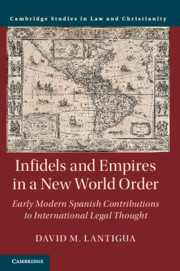 Infidels and Empires in a New World Order
Infidels and Empires in a New World Order Book contents
- Infidels and Empires in a New World Order
- Law and Christianity
- Infidels and Empires in a New World Order
- Copyright page
- Dedication
- Contents
- Figures
- Acknowledgments
- 1 Introduction: International Relations Beyond Westphalia
- Part I The New World Crucible of Infidel Rights
- 2 Theocratic World Order and Religious Wars
- 3 Spanish Dominicans and the “Affair of the Indies”
- 4 The Politics of Natural Law at Valladolid, 1550–1551
- Part II God, Empires, and International Society
- Bibliography
- Index
3 - Spanish Dominicans and the “Affair of the Indies”
from Part I - The New World Crucible of Infidel Rights
Published online by Cambridge University Press: 11 June 2020
- Infidels and Empires in a New World Order
- Law and Christianity
- Infidels and Empires in a New World Order
- Copyright page
- Dedication
- Contents
- Figures
- Acknowledgments
- 1 Introduction: International Relations Beyond Westphalia
- Part I The New World Crucible of Infidel Rights
- 2 Theocratic World Order and Religious Wars
- 3 Spanish Dominicans and the “Affair of the Indies”
- 4 The Politics of Natural Law at Valladolid, 1550–1551
- Part II God, Empires, and International Society
- Bibliography
- Index
Summary
Beginning with their Master General, Cajetan, Spanish Dominicans precipitated and outlined the theological parameters for thinking about infidel dominium of peoples outside Europe as a matter of restitution and salvation. This pairing of justice and evangelization opposed the long-standing idea and practice of missionary war in the theocratic conception of world order that linked conquest and preaching and was being defended by Spanish theocratic royalists and the “modern” theology of John Mair. In 1535, after Francisco Pizarro’s conquest of the Inca, Francisco de Vitoria, Domingo Soto, and Bartolomé de las Casas drew from the inspirational example of the first Dominican missionaries to the New World and began formulating an unprecedented scholastic theological conception of world order. Appealing to Scripture, the apostolic tradition, Thomistic moral theology, Roman law, and canon law, their account of world order contained a discourse of natural subjective rights for all persons made in the divine image, attentive to restoring the injustices suffered by the Amerindians of the New World. The originality of the Spanish Dominicans, with Vitoria’s Relectio de Indis at the center, lay in their articulation of infidel rights over and against unjust European claims of expansionary religious wars waged by emperors and popes alike.
Keywords
- Type
- Chapter
- Information
- Infidels and Empires in a New World OrderEarly Modern Spanish Contributions to International Legal Thought, pp. 74 - 140Publisher: Cambridge University PressPrint publication year: 2020
